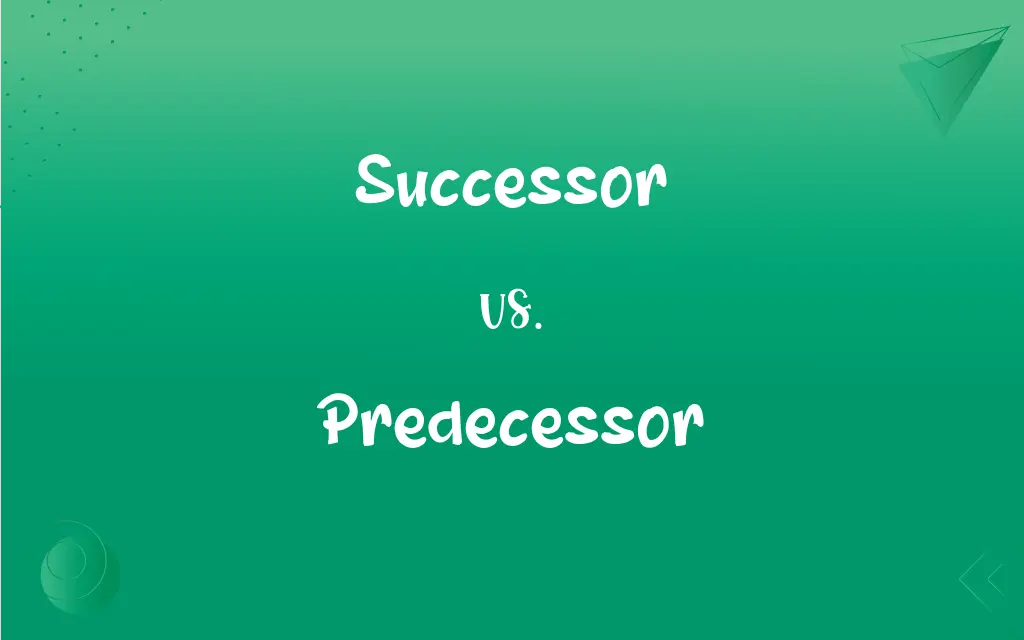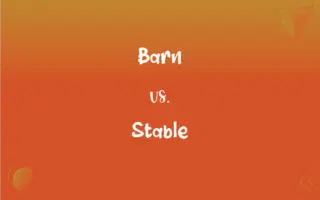Successor vs. Predecessor: What's the Difference?
Edited by Aimie Carlson || By Janet White || Updated on October 2, 2023
A successor follows or replaces another in a role or position, while a predecessor is the one who held the role or position before.

Key Differences
Successor and predecessor represent opposite concepts relating to the sequence or transition of roles, positions, or elements. A successor is an individual or entity that follows and typically replaces another in holding a position, role, or status. It’s used to describe the person or thing that comes after another in time, typically implying a continuation or progression in a series or succession line. Successors often inherit or adopt the responsibilities, duties, and privileges of their predecessors, signifying forward movement or advancement in time or sequence.
Conversely, a predecessor is an individual or entity that previously held a position, role, or status before being succeeded by another. This term is used to describe someone or something that has been replaced or followed by a successor. Predecessors represent the past holders or manifestations of roles or positions, indicating a prior state or condition in a series or succession line. They are the ones who have set precedents, established conditions, or performed duties before passing them onto their successors.
In the context of roles or positions, the successor is the next holder or occupant, assuming the function, duty, or status previously held by the predecessor. Successors are associated with newness, the future, and continuation, stepping into the shoes of their predecessors to carry on the work or maintain the status established by them. The concept of a successor implies an onward and upward movement, a step forward in time, or progression in a series or lineage.
On the other hand, the predecessor is associated with the past, originality, and establishment, being the former holder or occupant of a role or position. Predecessors have laid the groundwork, established the norms, and set the standards that are to be followed or modified by their successors. They signify the starting point, the origin, or the former state of a role or position in a sequence or lineage.
In summary, a successor represents the forthcoming, the new holder of a role or position, taking over from a predecessor. A predecessor signifies the preceding, the former holder of a role or position, who has been followed by a successor. These terms illustrate the continuity and transition in roles, positions, or sequences, reflecting the cyclic nature of progression and succession in various contexts.
ADVERTISEMENT
Comparison Chart
Temporal
Pertains to the future or forthcoming holder of a role.
Pertains to the past or former holder of a role.
Orientation
Follows or replaces another in a role or position.
Held the role or position before being succeeded by another.
Connotation
Implies continuation or progression in a series.
Represents a prior state or condition in a series.
Association
Newness, advancement, inheritance.
Originality, establishment, foundation.
Position
Next in line or sequence.
Previous in line or sequence.
ADVERTISEMENT
Successor and Predecessor Definitions
Successor
A person or thing that succeeds another in time.
The next generation is the successor to the current one.
Predecessor
One who held a role or position before the current holder.
The previous model was the predecessor to the current one.
Successor
An individual who takes over the responsibilities and duties of another.
The vice president is the likely successor to the president.
Predecessor
A person or thing that preceded another in time.
The original design is the predecessor to the updated version.
Successor
An entity or person that inherits a role or status.
The new CEO is the successor of the company’s founder.
Predecessor
An entity or person that was succeeded by another.
The former CEO is the predecessor of the current leader.
Successor
The next in line or sequence.
The upcoming model is the successor to the existing one.
Predecessor
The one who was in a role or position in the past.
The past generation was the predecessor to the present one.
Successor
One who follows or replaces another in a role or position.
The current president is the successor to the previous one.
Predecessor
An individual whose responsibilities and duties have been taken over by another.
The founding president is the predecessor of the current president.
Successor
One that succeeds another.
Predecessor
One who precedes another in time, especially in holding an office or position.
Successor
A person or thing that immediately follows another in holding an office or title.
George W. Bush was successor to Bill Clinton as President of the US.
Predecessor
Something that has been succeeded by another
The new building is more spacious than its predecessor.
Successor
The next heir in order or succession.
Predecessor
An ancestor; a forebear.
Successor
A person who inherits a title or office.
Predecessor
One who precedes; one who has preceded another in any state, position, office, etc.; one whom another follows or comes after, in any office or position.
Successor
The integer, ordinal number or cardinal number immediately following another.
A limit ordinal is not the successor of any ordinal.
Predecessor
A model or type of machinery or device which precedes the current (or later) one. Usually used to describe an earlier, outdated model.
The steam engine was the predecessor of diesel and electric locomotives.
Successor
One who succeeds or follows; one who takes the place which another has left, and sustains the like part or character; - correlative to predecessor; as, the successor of a deceased king.
A gift to a corporation, either of lands or of chattels, without naming their successors, vests an absolute property in them so lond as the corporation subsists.
Predecessor
(mathematics) A vertex having a directed path to another vertex
Successor
A person who follows next in order;
He was President Lincoln's successor
Predecessor
One who precedes; one who has preceded another in any state, position, office, etc.; one whom another follows or comes after, in any office or position.
A prince who was as watchful as his predecessor had been over the interests of the state.
Successor
A thing or person that immediately replaces something or someone
Predecessor
One who precedes you in time (as in holding a position or office)
Successor
A person who inherits some title or office
FAQs
Can a predecessor influence a successor?
Yes, a predecessor can significantly influence a successor through established norms, conditions, and precedents.
Can there be multiple successors and predecessors in a sequence?
Yes, there can be a series of successors and predecessors in chronological order or sequence.
What is the key distinction between a successor and a predecessor?
A successor follows or replaces someone in a role, while a predecessor is the one who was in the role before.
Is a successor always an individual?
No, a successor can be an individual, entity, concept, or system that follows or replaces another.
Is the role of a successor always identical to that of their predecessor?
No, the role of a successor may evolve or change, differing from that of their predecessor.
Can a predecessor return to their former role after being succeeded?
It is possible, though uncommon, for a predecessor to return to their former role, depending on the circumstances and regulations.
Do successors always follow immediately after their predecessors?
Typically, yes, but there can be interim periods or transitions between a predecessor leaving and a successor assuming the role.
Can an entity be both a successor and a predecessor?
Yes, an entity can be a successor to one predecessor and, in turn, become a predecessor to a future successor.
Can a successor have multiple predecessors?
Typically, a successor has one immediate predecessor but may have multiple predecessors in a broader historical or sequential context.
Do the terms successor and predecessor imply a hierarchy?
Often, but not necessarily; they primarily denote sequence or succession, which can occur in hierarchical and non-hierarchical contexts.
Can a successor reject the approaches of their predecessor?
Yes, a successor may choose to adopt, modify, or reject the approaches and policies of their predecessor.
Is the concept of successor and predecessor limited to roles and positions?
No, these concepts can also apply to sequences, generations, models, versions, and more.
Can a predecessor and successor coexist?
In some cases, a predecessor may remain in a different capacity while their successor assumes the primary role.
Can a predecessor’s actions affect the success of their successor?
Absolutely, the actions, decisions, and policies of a predecessor can have lasting impacts on their successor.
Can the words successor and predecessor be used interchangeably?
No, they have opposite meanings; successor refers to one who follows, while predecessor refers to one who precedes.
About Author
Written by
Janet WhiteJanet White has been an esteemed writer and blogger for Difference Wiki. Holding a Master's degree in Science and Medical Journalism from the prestigious Boston University, she has consistently demonstrated her expertise and passion for her field. When she's not immersed in her work, Janet relishes her time exercising, delving into a good book, and cherishing moments with friends and family.
Edited by
Aimie CarlsonAimie Carlson, holding a master's degree in English literature, is a fervent English language enthusiast. She lends her writing talents to Difference Wiki, a prominent website that specializes in comparisons, offering readers insightful analyses that both captivate and inform.































































